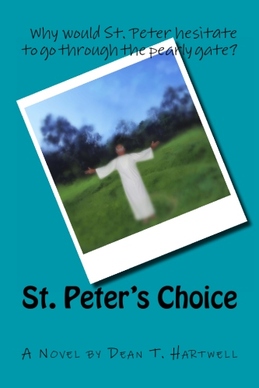
Says "Elizabeth":
"...Thank you Mr. Hartwell for a book that is not only entertaining, but also makes the reader think. This book is definitely 'my cup of tea'!!"
 Read the first review of St. Peter's Choice here! Says "Elizabeth": "...Thank you Mr. Hartwell for a book that is not only entertaining, but also makes the reader think. This book is definitely 'my cup of tea'!!"
0 Comments
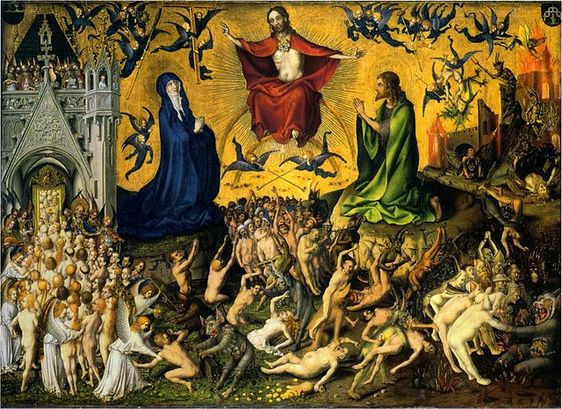 Someone offers you a contract. If you sign it, you have obligations and rights under the contract. If you refuse it, nothing happens. In the Christian religion, God offers you a contract. If you sign it, you are obligated to believe that Jesus is the son of God and you have the right to go to the Christian heaven. If you refuse it, you go to hell. Would a kind, compassionate God force you to believe something? 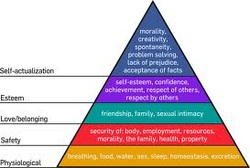 Many people laugh when I suggest that people connected to the government lied to the public about the events of 9/11. But when I say politicians lie, or members of the Supreme Court lie, or that public officials lie about other matters, the same people nod their heads and agree enthusiastically. Why is that? It has to do with needs. If one determines that they need something, they tend to hold on to it more tightly than something they could do without. This attitude is simple human nature. According to Maslow’s Hierarchy of Needs (see picture), a person’s first set of needs are the most basic: we all need to breathe, drink water, eat food, etc. If we are dependent (or believe we are dependent) upon someone else to provide these necessities, we would not likely question that person or antagonize them. We could be saying goodbye to our lives! Once a person achieves this first set of needs, this theory tells us, they are able to handle the next set, which is about the security of: one’s person, employment, health, etc. If one does not feel secure about themselves and about their position in society, they will not be able to move up the “ladder” of the hierarchy and make friends or feel self-confidence. “Rocking the boat” and questioning those who provide security, such as agents of our government, jeopardizes one’s ability to become a confident and social person. It may not be the same as being deprived of water, but one who openly doubts those charged with providing security risks social suicide! No wonder a majority of people still trust our government with the responsibility of protecting us from attack, despite overwhelming evidence that the events of 9/11 were a hoax! It is far safer to “settle” for accusing politicians of lying and cheating because there is no fear of retaliation or alienation for espousing these views. Yes, we all understand the advantage of safety: one does not have to lift a finger. Imagine the possibility of afterlife. This idea goes beyond one’s security on the temporary home of Planet Earth. It goes to eternal life. Imagine a deity who records your every thought and action. Imagine your destination after life going favorably in one direction and horribly in another direction. Imagine this deity having control over which way you go. Many of those who are willing to speak out against the actions of those charged with running our government are unwilling to speak up about certain religions that threaten eternal insecurity to those that question the deity. There is something missing in the Maslow’s theory. Somewhere after we get our water and our food, we need to grasp the right to ask questions and to obtain answers. The idea of either trusting our leaders blindly to protect us or to face alienation is not sufficient for any of us to function in a world of deception and lies. That’s my theory. We need choices that reflect our needs, not our fears. 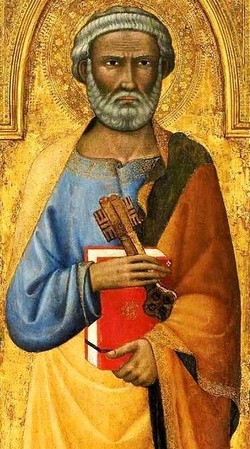 Some people belong to a religion and their beliefs give them all the answers they need. Good for them. I do not have that kind of belief. With this book, I explore answers to many questions I have had, such as: Is there a God? Is there life after death? What is virtue and what does one do if they believe that a god does not show virtue? The characters in my book cannot get any answers from the Christian God. So they ask a saint, instead. St. Peter turns out to be a reasonable person who listens to and converses with non-believers. If he does not know the answer to a question, he says, "I don't know." He shows a willingness to change his mind even on deeply-held beliefs when shown valid evidence. Believers in Christianity are not criticized in St. Peter's Choice. But believers and non-believers alike will see an articulate case against the supposed God of this religion. Daring to challenge assumptions about God and the afterlife, the novel St. Peter’s Choice arrives now to an audience of those willing to think freely.
It is Judgment Day. The “rock” of the Christian religion begins to change his mind about going to heaven after he decides to talk to those sent to hell. When he speaks to God later about the conversation, he finds he has a choice to make between faith and reason. This novel is unique in that it provides ample footnotes from the Bible and other works that analyze Christianity. An appendix also gives background to issues raised by the characters in the book. A bibliography shows books of influence to the author, most notably Open Tomb: How and Why Jesus Faked His Death and Resurrection by David Mirsch. Buy it here 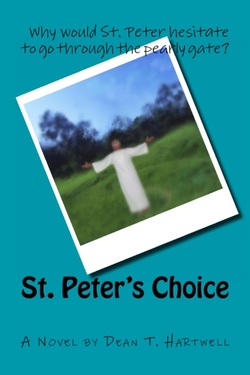 Assertions by Christians: There is a God. He is my God. There are no other Gods. Those who believe as I do are rewarded after death. Everyone else fails to get the reward. I know people who believe in this manner. Many of them are, from my point of view, good people. Some are not. The novel, St. Peter’s Choice, asks the reader to assume, for the sake of argument, the truth of this set of assertions. It then challenges the reader to decide if this is a God they would choose. Through the novel, interesting questions come up: Is God good? Is heaven a desirable place? Does hell exist? Why does the Old Testament God have so many capital offenses? What does one do if one’s reason leads them to disbelieve in God? St. Peter’s Choice will be available on Amazon and other stores soon! 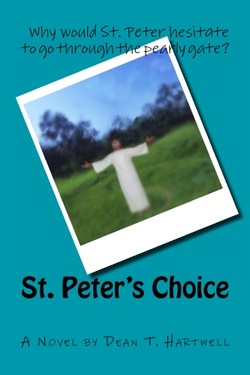 Daring to challenge assumptions about God and the afterlife, the novel St. Peter’s Choice by Dean T. Hartwell arrives soon to an audience of those willing to think freely. It is Judgment Day. The “rock” of the Christian religion begins to change his mind about going to heaven after he decides to talk to those sent to hell. When he speaks to God later about the conversations, he finds he has a choice to make between faith and reason.  As a child, there was a phrase I had to say every day… ONE NATION UNDER GOD My kindergarten class says there is a God, but my parents don’t. Why should I recite this pledge? BECAUSE I SAID SO The principal says I must say it. Maybe he is wrong. YOU’RE A LOSER* IF YOU BELIEVE THAT I tried to trust God, but my friend died in a car accident. GOD MUST HAVE HAD A PLAN Then I do not care for God. FOR GOD SO LOVED THE WORLD… Then why does he let innocent people die? HAVE FAITH Faith in what? A God I cannot see? A Bible I read and do not believe? ONE NATION UNDER GOD My nation sends troops to fight wars that make no sense. OUR GOVERNMENT WOULD NEVER DO THAT Where are the weapons of mass destruction? I CANNOT REVEAL MY SOURCES What? SUPPORT THE TROOPS I support the troops coming home and for all of them to stop supporting wars based on lies. THE TERRORISTS DID IT What terrorists are you talking about? I CANNOT REVEAL MY SOURCES Who can I trust? FOR GOD SO LOVED THE WORLD... I give up. Is there something you can tell me not connected to God or country? "RAYMOND SHAW IS THE KINDEST, BRAVEST, WARMEST, MOST WONDERFUL HUMAN BEING I'VE EVER KNOWN IN MY LIFE."** --- *or a communist, a traitor, a conspiracy theorist, etc. **from The Manchurian Candidate, a movie based on the novel by Richard Condon St. Peter's ChoiceI recently wrote my thoughts about what would happen to me if there really were a Christian "Judgment Day." It was in an essay called "The Gospel of Dean."
God told many of us to go to a place of everlasting fire because we did not believe in his son. We got close to hell and discovered that the fire was only an appearance. We were the people that overcame the threat of hell and lived our lives in accordance with our own principles instead of expecting a reward. Now I turn to those in the other line. St. Peter is standing in front of heaven calling out names from the "Book of Life." It looks like (after hundreds of years) that he is just about finished. Let's listen in: St. Peter: I call the name John Doe. John: That's me! St. Peter: So what have you got to say about your life? John: I believe in Jesus. St. Peter: You do? John: Yes, sir! I am saved! May I go in now? St. Peter: Just a minute. You are going to get an eternity in there. What's the hurry? John: Uhh... St. Peter: What caused you to believe in Jesus? John: I was in prison. St. Peter: What for? John: Murder. St. Peter: Were you guilty? John: Uhh... St. Peter: You know I can call God and ask him. John: Well, yes, I was. St. Peter: So what are you anxious about? John: Uhh, I just saw one of my victims in there. St. Peter: OK, John. I have nowhere else to send you. God says you are allowed in, so go on. John Doe walks through the pearly gates and makes a sharp right turn. St. Peter: I call the name Sally Doe Sally: Here I am! St. Peter: How was your life? Sally: I did it all for Christ! St. Peter: How did you do that? Sally: I called people out for being sinners? St. Peter: Who were these sinners? Sally: Liberals, homosexuals, and other Bible-hating heathens who are burning in hell now. St. Peter: How do you know this? Sally: It says God hates them in the Bible. St. Peter (pulls out a Bible): Show me where in here. Sally: Uhh... St. Peter: Was it the New Testament or the Old? Sally: What do you mean? St. Peter: Have you ever read the Bible? Sally: Well, no...Is God mad at me? St. Peter: I don't know. But you can go through the gates to heaven now. Sally wanders through the pearly gates. St. Peter: I call the name Richard Rich. Richard: That's me. St. Peter: How did life go for you? Richard: I am blessed. St. Peter: How so? Richard: God gave me such a wonderful life. St. Peter: What made it wonderful? Richard: He showed me how to make money using Christian principles. St. Peter: Did you help the poor with any of that money? Richard: The poor? Who cares about them? St. Peter: Well, Jesus did. Surely you have read the "Sermon on the Mount." Richard: Yeah. I read that. But the Bible says that people should not be lazy, too. St. Peter: But not all poor people are lazy. Richard: St. Peter, I've had enough of this socialist talk. May I go now? St. Peter: Sure. But you know you can't take it with you. Richard laughs and goes through the pearly gates. God returns from sending people to hell. St. Peter drops the "Book of Life" and looks away from God. God: Peter, you've got one more name on that list. St. Peter: Yes. Of course you know it is mine. God: So why don't you read it and enjoy your reward? St. Peter: God, I can't believe some of the people who just went to heaven. God: They all believe in my son and that is what matters. St. Peter: You know I like your son and many of the people in heaven were good people, but... God: But what? St. Peter: But I want to go talk to the people you sent to hell. God: Why? St. Peter: I want to ask them why they rejected heaven. They must have had their reasons. Suddenly God disappeared and St. Peter was walking toward hell. He had one thought on his mind that he believes those in heaven never considered: "What is the point of going to heaven if you lose your soul along the way?" |
AuthorDean Hartwell keeps pursuing the truth about those who govern us. Categories
All
Archives
May 2020
|